Donald Trump’s recent announcement of selecting former acting Attorney General Matt Whitaker as the U.S. ambassador to NATO has drawn attention due to Whitaker’s unconventional background in law enforcement rather than foreign policy. Trump characterized Whitaker as “a strong warrior and loyal Patriot,” capable of advancing U.S. interests at NATO and enhancing relationships with member nations. Despite being a notable figure in U.S. political circles, Whitaker’s international experience is limited, raising questions about his ability to effectively navigate the complex landscape of global diplomacy, particularly within NATO, which has often been a point of contention for Trump since his 2016 campaign.
Whitaker’s prior roles included serving as U.S. attorney in Iowa and acting attorney general during a critical period when the Mueller investigation into Russian interference was concluding. His tenure as acting attorney general raised eyebrows due to its lack of Senate confirmation, resulting from his predecessor, Jeff Sessions’s, controversial firing that stemmed from frustrations over his commitment to the Russia investigation. While Whitaker has garnered support from Trump due to his loyalty and outspoken criticism of the federal investigations into Trump’s conduct, his unfamiliarity with national security and international relations makes his selection intriguing, especially for a post that traditionally requires significant diplomatic expertise.
The significance of the NATO ambassador role cannot be overstated, as highlighted by retired Gen. Philip Breedlove, a former supreme allied commander of NATO. This position is critical within both the U.S. government and the NATO alliance, serving as a bridge between the president’s policies and NATO’s strategic decisions. Historical precedence suggests that appointees to this position typically possess extensive experience in diplomacy, military affairs, or political operations, which Whitaker notably lacks. Although previous ambassadors in this role have had varying backgrounds, the criterion of direct presidential trust and communication remains vital for optimal effectiveness.
Trump’s past statements on NATO have complicated the perception surrounding U.S. commitment to the alliance, with his promises during his earlier presidency that only allies meeting specific defense spending goals would receive support from the U.S. This perspective alarmed many allies, creating unease about the future of NATO’s collective security strategies. While Trump later endorsed NATO’s principle of collective defense under Article 5, the impression he left regarding his willingness to support countries that do not meet the 2% GDP defense spending target raised significant concerns, particularly among European members vested in maintaining a strong transatlantic relationship.
The decision to appoint Whitaker reflects Trump’s ongoing efforts to reshape NATO’s dynamics and address his frustrations with member countries’ spending commitments. Reports show an increase in the number of NATO countries meeting the 2% benchmark, attributed in part to heightened security concerns following Russia’s invasion of Ukraine. Trump has publicly touted his role in motivating NATO allies to ramp up their military budgets, claiming that his tough negotiations brought in “hundreds of billions of dollars,” despite those funds not being directed to NATO itself. This claim underscores an ongoing narrative of leveraging financial accountability within the alliance.
In addition to Whitaker’s limited foreign policy experience, potential ethical concerns also linger regarding his past business affiliations, particularly with an invention-promotion company under investigation for fraud. Such scrutiny might impact his effectiveness and reputation as ambassador, especially with a role demanding credibility and trust to foster productive dialogue among diverse NATO partners. The stakes are high for Whitaker, who must now navigate a complex geopolitical landscape and fortify relationships that have been strained by past declarations, while also ensuring that American interests remain a priority in the ongoing and evolving dynamics of international security.

